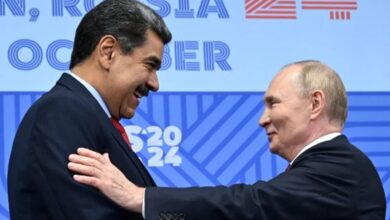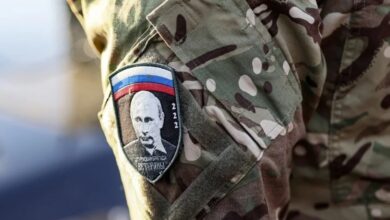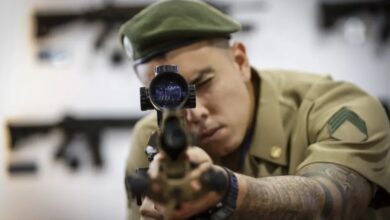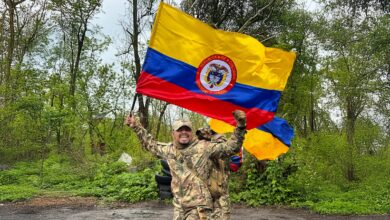Putin Will Not Eliminate “Nazism” In Ukraine, He Could Strengthen It
Russia's invasion of Ukraine is not going to "denazify" anyone, on the contrary, it could empower them .

Photo: kremlin.ru
LatinAmerican Post | Santiago Gómez Hernández
Listen to this article
Leer en español: Putin no eliminará el “nazismo” en Ucrania, podría fortalecerlo
One of the arguments used by Vladimir Putin for the Russian army to enter the Ukrainian borders was to "denazify" Ukraine. Today this argument appears in various media allied and sympathetic to the Russian Government,
However, as has been made clear in various media, the argument that a government headed by President Volodimir Zylensky, a Jewish politician, is Nazi, is difficult to believe.
However, the images and videos linking the Ukrainian military with extremist and neo-Nazi groups are evident. It is impossible to deny its existence. Now, that this is a majority or that they largely represent the entire Ukrainian military may be an exaggerated statement that Putin is evidently using to excuse his expansionist intentions in eastern Ukraine.
The Nazi footprint in the Ukraine
It is impossible to deny that Ukraine has also had, in its history, a Nazi legacy. During World War II, the Jewish population of Ukraine was also persecuted amid Nazi control when troops from the Third Reich arrived. This, under the local support of some Ukrainians, created one of the darkest chapters in the history of the country and of humanity.
You may also be interested in: The forgotten wars: current armed conflicts in the world
Whether due to anti-Soviet sentiments or political expediency, many Ukrainians preferred to welcome Hitler's German army rather than fight it. But, it is also important to remember that there were many others who declared themselves against the Nazi invasion and many others who joined the Red Army.
The war between Ukrainians and Russians
Although the invasion marked the beginning of the war between Russia and Ukraine, the war between "Ukrainians" and "Russians" is long overdue. For this, it is necessary to take into account that the regions of Donbas and Lugansk in eastern Ukraine have a Russian majority. Much of the local population seeks independence and while kyiv refuses to lose territory they consider sovereign. This has left a civil war in the east of the country that has been facing the population born in Ukraine but with Russian ties, identity and support; and a Ukrainian army and militias.
These ultranationalist militias that refuse to lose territory at the hands of a foreign power, is what is feeding these neo-Nazi groups today. Nationalist, military groups with anti-Russian discourses that boast of Nazi symbols and traditions and that today are used by Russia as a reason for the invasion.
However, these ultra-nationalist groups and sentiments have been strengthened. With a common enemy, Russia, now the self-defense groups with nationalist ideals have a fertile field to harvest support and popularity.
This shows that Vladimir Putin's alleged strategy of denazifying Ukraine may end up having the completely opposite effect. It will end up having a population exalted in patriotic and ultranationalist values and symbols that will see the Russian minorities as an enemy to exterminate.
The Azov Regime
The Azov regime or army is a contingent of the Ukrainian army that in 2016 had a political branch when the Nationalist party was founded. It was born in 2014, right in the middle of the Russian-Ukrainian conflict. Since then, they have been playing a relevant role in the civil war in Donbas and in the conflict with Russia.
Although it is true that if there is closeness with white supremacist speeches and the use of Nazi symbology (which the same international press has documented in the civil war in eastern Ukraine), they have tried to lose that identity since they were ntegrated into the army.
Their ties to extremist ideas are no secret. Even the US Congress itself has discussed whether to include it, at the time, as a terrorist group . Additionally, its former leader, Andriy Biletsky, said in 2010 that his goal was "to lead all the white races of the world in an international crusade."
However, to assume that the entire extremist burden of this group must be carried by the whole of Ukraine is evidence of a lack of knowledge. Precisely the political group that broke away from the Azov, barely got 2.15% of the vote in 2019. Even Biletsky lost his seat in the national parliament. It also seems unfair to cross out the entire Ukrainian military for a battalion of 900 members, according to estimates by the Al-Jazeera network .
However, it is true that the crimes that have been committed in the east of the country by both sides (including the Azov regime) have gone unpunished. This serious error of the Rule of Law and of the West created a platform for Russia to attack.
The only way this group was created was with the exaltation of patriotism after the annexation of Crimea and Russian interference. Their popularity in Ukraine is low (shown by their low support in the 2019 elections), but the only way for them to gain recognition is through their "heroic" image in the midst of a conflict that Putin has restarted.




